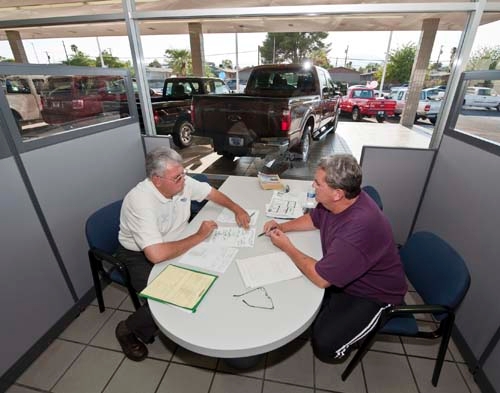June numbers show Nevada taxable sales up
Construction just can't dig out of its deep hole, even as the rest of the Nevada economy shows signs of improvement.
Nevada's taxable sales totaled $3.6 billion in June, up 9 percent compared with $3.3 billion in June 2010, the state Taxation Department reported Monday. Sales in Clark County increased to $2.6 billion, up 8.1 percent from $2.4 billion a year ago. Sales among car dealers, restaurants, clothing stores, machinery manufacturers and wholesalers of durable goods all jumped by double- and triple-digit percentage points. Transactions inside furniture stores and department stores held steady.
But construction? Down 17 percent -- yet another month in a three-year string of double-digit percentage declines for the sector.
June construction sales came in at $42.8 million in Clark County, and $75.7 million statewide.
During the state's boom, in June 2006, construction sales totaled $152.3 million in Clark County and $210.6 million statewide.
"Construction spending has trailed off to what are probably near all-time lows," said Brian Gordon, a principal in local research and consulting firm Applied Analysis.
The decline isn't as pronounced as it was at the downturn's depths. In 2009 and 2010, construction sales fell anywhere from 35 percent to 55 percent a month on a year-over-year basis.
Experts say that doesn't mean the downward trend is about to reverse. They say there's just not enough demand for new buildings.
Consider residential housing. Steve Brown, director of the Center for Business and Economic Research at the University of Nevada, Las Vegas, says the Las Vegas Valley has an 8.5 percent housing vacancy rate. If population growth stays at its current half a percent a year, it'll take 16 years to chew through that inventory.
It's not much better on the commercial side. Mike Hillis, managing partner with local commercial brokerage Cushman & Wakefield/Commerce, says the city's office market is 22 percent vacant. If businesses took over 1.5 million square feet of space a year, the market could work through its inventory in six or seven years, Hillis said. But there's virtually no leasing activity on new space these days.
"That tells you we're not going to see construction of new, speculative office product for the next several years, at least," Hillis said.
The story is similar in industrial and retail space, he added.
Observers did say that the worst declines have likely passed. Construction made up 12 percent of the local job base before the recession, Gordon noted. Today, the industry accounts for 5 percent of area jobs, close to the national average.
What's more, Cushman & Wakefield/Commerce's second-quarter numbers showed positive office and warehouse absorption, meaning businesses took over more space than came on the market. The improvement was "tiny," Hillis said, but it was the first gain since 2008.
Brown said he believes the local construction market has reached its floor, and employment in the industry is at "pretty sustainable levels." And if the national economy turns around noticeably, expect local population growth -- and construction demand -- to tick back up as Americans move in search of cheaper housing, he added.
Still, significant improvements in the national economy could take two more years, Brown said.
In the meantime, construction spending could fall even more.
"I don't think we're at the bottom for the construction sector," Gordon said. "With several years' worth of inventory on the market, we're probably looking at several years of correction cycle."
Taxable sales measure tangible goods sold through Nevada's businesses. Revenue from taxable sales helps fund public schools and prisons. The state collected $285.1 million in gross revenue from sales and use taxes in June, a 9.2 percent increase year over year.
June also marked the end of fiscal 2011. The general fund's fiscal-year share of sales and uses taxes came in
1.4 percent, or $10.8 million, above forecasts of the Economic Forum, a nonpartisan group that projects revenue for state budgeting.
Contact reporter Jennifer Robison at
jrobison@reviewjournal.com or 702-380-4512.


















